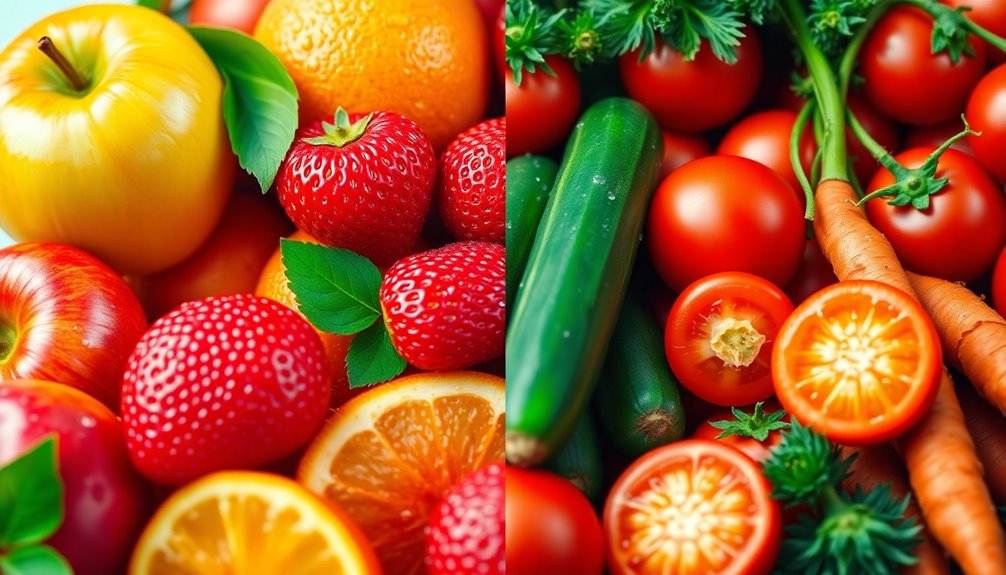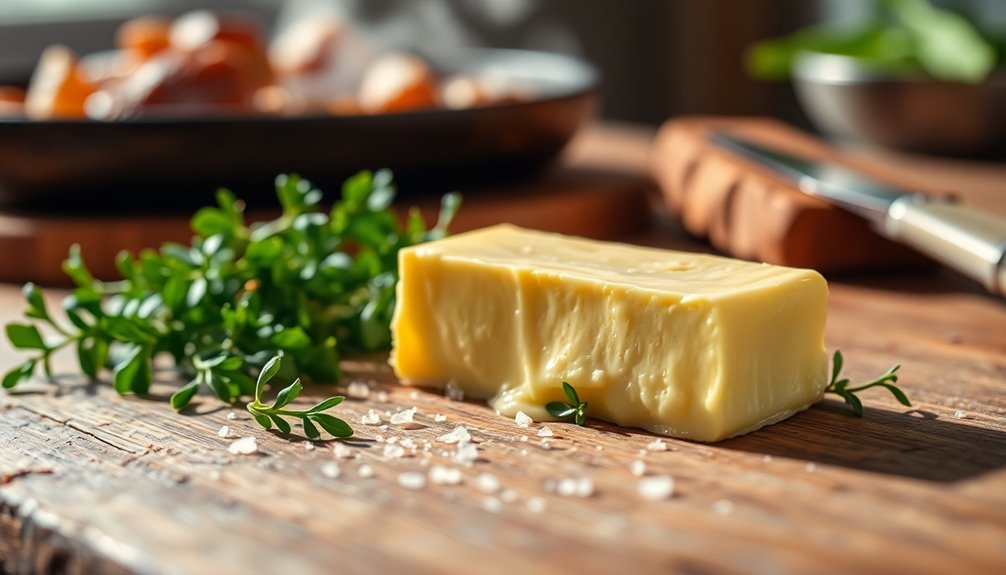Yes, you can lose weight on a high-fat diet, but it's not as simple as just eating more fat. For effective weight loss, you must manage your overall calorie intake. While high-fat diets can kickstart weight loss through ketosis, they might not sustain long-term results without careful planning. You might initially drop weight quickly, but relying solely on fats could lead to increased calorie consumption. Additionally, you may find that protein-rich foods promote satiety better. There's a lot more to understand about balancing fats and calories for lasting success, so keep exploring for more insights on this topic!
Key Takeaways
- High-fat diets can induce initial weight loss by promoting ketosis, which shifts energy use from carbohydrates to fats.
- Long-term weight loss on high-fat diets is challenging; a caloric deficit is essential for effective results regardless of macronutrient composition.
- Increased fat consumption often leads to higher overall calorie intake, counteracting weight loss efforts due to insufficient satiety.
- Protein-rich foods are more effective for lasting fullness and weight management compared to high-fat options.
- Sustainable weight loss may require transitioning to a balanced diet after initial success on a high-fat regimen.
Understanding High Fat Diets

High-fat diets, like the ketogenic diet, have gained popularity for their unique approach to nutrition. These diets typically consist of 60% to 80% of calories from fat, encouraging your body to enter a metabolic state called ketosis.
In ketosis, your body shifts from using carbohydrates for energy to burning fat instead. This change can reduce insulin levels, which might help curtail cravings for sugary snacks and stabilize your blood sugar.
While many people associate high-fat diets with weight loss, recent studies suggest that their effectiveness for long-term weight management may not be as significant as once thought.
Although it's claimed that consuming more fat can boost energy and fat burning, research indicates that simply increasing your fat intake doesn't automatically enhance fat oxidation or caloric expenditure unless you also restrict carbohydrate intake.
Moreover, the growing acceptance of high-fat diets challenges traditional dietary guidelines that warned against fats. Additionally, some studies suggest that incorporating herbal alternatives may also support skin health and overall vitality during weight loss journeys.
As you reconsider these guidelines, it's essential to understand the role different types of fats play in a balanced diet and how they might influence your overall health and weight loss goals.
The Science of Fat Oxidation

When you switch to a high-fat diet, your body starts adapting its fuel usage by increasing fat oxidation.
However, it's important to recognize that just because you burn more fat doesn't mean you'll lose weight if your caloric intake is too high.
In addition, maintaining a balanced intake of nutrient deficiencies is crucial to support overall health during dietary changes.
Let's explore how these factors interact and what they mean for your weight loss goals.
Fuel Usage Adaptation
The body's ability to adapt its fuel usage is fascinating, particularly in how it shifts energy reliance from carbohydrates to fats on a low-carbohydrate, high-fat diet. When you reduce carbs, your body begins to increase fat oxidation, allowing you to utilize dietary fat more efficiently. However, it's vital to understand that merely increasing fat intake won't guarantee weight loss; it's all about maintaining a caloric deficit.
Here's a quick look at how fuel usage changes on high-fat diets:
| Fuel Source | Usage Before Low-Carb Diet | Usage After Low-Carb Diet |
|---|---|---|
| Carbohydrates | High | Low |
| Dietary Fat | Low | High |
| Fat Oxidation Rate | Moderate | Increased |
While higher fat oxidation can occur, it doesn't automatically lead to greater weight loss unless you're aware of your caloric balance. Remember, the efficiency of dietary fat storage is about 96%, making it important to monitor your intake. Ultimately, achieving weight loss relies on maintaining a net caloric deficit, not just focusing on fat intake alone.
Caloric Expenditure Myths
Understanding how your body oxidizes fat is important, especially when pondering caloric expenditure myths that surround high-fat diets. Here are four key points to reflect on:
- Caloric Expenditure: High-fat diets don't increase calorie burning compared to high-carb diets.
- Energy Expenditure: Increased fat intake doesn't boost your metabolic rate; it often leads to higher overall calorie consumption.
- Weight Gain: Dietary fat is stored as body fat at about 96% efficiency, considerably contributing to weight gain when consumed in excess.
- Caloric Deficit: To lose weight, you need a caloric deficit; fat oxidation alone won't lead to fat loss without balancing total calorie consumption.
While higher fat intake may seem beneficial for fat oxidation, it doesn't guarantee weight loss.
If you're consuming more calories than your body uses, even a high-fat diet can lead to weight gain.
It's essential to focus on your total caloric intake rather than just the macronutrient composition.
Fat Oxidation vs. Weight Loss
Fat oxidation plays an essential role in how your body utilizes energy, but it doesn't guarantee weight loss. While you might increase fat oxidation on a high-fat diet, that doesn't automatically mean you'll shed pounds. The key factor for effective weight loss is maintaining a caloric deficit. This means you need to burn more calories than you consume.
Research shows that higher fat intake can lead to increased fat oxidation, but if your caloric intake exceeds your expenditure, weight gain can still occur. In fact, many people on high-fat diets end up consuming more calories overall, potentially negating any benefits from increased fat oxidation.
Even if your body burns fat for energy, it doesn't mean you're reducing fat storage. Excess calories from any macronutrient—carbs, protein, or dietary fat—can lead to weight gain. Additionally, understanding the importance of financial management can help you budget for healthier food choices that support your weight loss goals.
Ketosis and Metabolic Effects

Achieving ketosis can markedly alter your body's energy dynamics, shifting it from relying on carbohydrates to utilizing fat as its primary fuel source. When you're on a high-fat diet, your liver converts fatty acids into ketones, providing an alternative fuel source when glucose is sparse.
Here's what you should know about the metabolic effects of ketosis:
- Fat Loss: While you may experience initial weight loss, studies show that ketosis doesn't guarantee superior long-term fat loss compared to calorie-controlled diets.
- Insulin Sensitivity: Ketosis can improve insulin sensitivity, but the benefits may be minimal when considering overall calorie intake.
- Caloric Control: Elevated ketone levels don't greatly enhance fat loss; the key still lies in managing your calories.
- Weight Loss Variability: Many find that the weight loss effects of a high-fat diet can vary, leading to inconsistent results over time.
Ultimately, while ketosis can help you shift energy sources, it's crucial to focus on calorie management and adherence to see lasting results.
Carbs vs. Fats in Satiety

When considering weight loss strategies, the debate between carbs and fats often comes into play, particularly in relation to satiety. You might think that a high-fat diet will keep you fuller for longer, but research suggests otherwise.
While fats do provide some short-term satiety, they generally lead to higher calorie intake without meaningfully reducing hunger. For instance, studies show that consuming 300 calories from protein or 400 calories from carbohydrates offers similar satiety levels to 800 calories from fat. This highlights how inefficient fats can be in promoting fullness. Additionally, incorporating foods rich in vitamins and antioxidants can enhance overall health while managing hunger. Furthermore, starting your day with a protein-rich breakfast, like an egg rollup, can help curb cravings throughout the morning. Moreover, maintaining a balanced diet with IRS regulations can help ensure that your nutritional choices are aligned with long-term health goals. Research indicates that a keto diet can stabilize blood sugar levels, which may contribute to better appetite control.
Low-fat options like potatoes and oatmeal tend to be more satiating per calorie compared to high-fat foods like cheese and peanuts.
If you opt for a diet that consists of around 50% fat, you could end up eating approximately 750 calories more than if you were consuming 15-20% fat.
Overall, the relationship between fat intake and satiety indicates that while some claim high-fat diets are more filling, they often lead to increased calorie consumption, undermining your weight loss efforts. Listening to classical music has also been shown to enhance cognitive function, which may support better decision-making regarding food choices.
Focusing on protein and carbohydrates may be a more effective strategy for achieving lasting satiety and managing your weight.
Evaluating Common Misconceptions

You might believe that a high-fat diet automatically boosts calorie burning and reduces hunger, but that's not the whole story.
Research shows that fat intake doesn't necessarily lower overall calorie consumption, and it doesn't enhance calorie burning compared to carbs.
It's essential to unpack these myths to truly understand how fat impacts weight loss. Additionally, understanding how hydrocolloid technology can promote healing in other areas, like acne treatment, can help clarify the benefits of different dietary approaches.
Fat Intake Myths
Challenging long-held beliefs about fat intake is vital for understanding its role in weight management. Here are some common misconceptions you might encounter:
- High-fat diets automatically increase calorie burning: Studies show caloric expenditure remains constant, regardless of dietary fat or carbohydrate dominance.
- Eating fat leads to fat burning: While fat oxidation may increase, it doesn't guarantee fat loss; weight management hinges on net caloric balance.
- High-fat diets provide greater satiety: Research indicates that protein outperforms both fats and carbohydrates when it comes to keeping you full and aiding long-term weight management.
- Higher fat intake reduces overall consumption: In reality, those consuming more fat often end up eating considerably more calories overall.
Understanding these myths can help you make informed choices about your diet.
It's essential to focus on the balance of macronutrients, including protein, and to be aware of your overall consumption.
Ultimately, if you want to lose weight, prioritize a balanced approach that includes an awareness of caloric intake, rather than solely relying on fat intake.
Calorie Burn Misunderstandings
Calorie burn is often misunderstood in the context of high-fat diets, leading many to believe that simply increasing fat intake will enhance weight loss. In reality, studies show that individuals on a high-fat diet don't burn more calories than those following a high-carbohydrate diet when allowed to eat freely. This means that just eating more fat isn't an effective weight loss strategy.
Moreover, increased calorie intake from high-fat diets often results in weight gain. With dietary fat storage being around 96% efficient, excess fat is stored almost entirely as body fat. In contrast, carbohydrates are stored at about 80% efficiency. This efficiency implies that consuming higher fat can lead to consuming around 750 additional calories daily, which is significant.
To achieve weight loss, focus on creating a net caloric deficit rather than merely increasing fat oxidation. Burning more fat doesn't guarantee less fat storage if your overall calorie intake exceeds your caloric expenditure.
Effective weight loss strategies revolve around managing both fat and carbohydrate intake while ensuring you stay within your caloric needs. Understanding these nuances is essential for anyone steering through the complexities of a high-fat diet.
Personal Experiences and Results

Many participants frequently shared their personal experiences on a high-fat diet, noting impressive initial results. You might find it motivating to hear that many achieved:
- Weight Loss: An initial drop of three pounds within just two days.
- Body Fat Percentage: A noticeable decrease of four percent over ten days.
- Improved Appearance: Participants reported better skin and looser trousers by day nine.
- Reduced Sugar Cravings: A significant decline in cravings for unhealthy snacks made it easier to stick to the plan.
Meal preparation emerged as a critical factor for success. You'll realize that planning your meals is essential, as sourcing pre-cooked, sugar-free options can be quite challenging. Additionally, incorporating low carb high protein breakfasts can help maintain energy levels throughout the day. Including low-carb vegetables in your meals can also enhance fiber intake, supporting overall health.
While the initial success on a high-fat diet can be exhilarating, it's important to reflect on long-term practicality. Many participants found that shifting to a low-fat diet was beneficial for continued weight loss.
This highlights the need for a balanced approach. Embracing the high-fat diet may produce quick results, but thinking ahead is imperative to maintain your progress and keep those sugar cravings at bay.
Frequently Asked Questions
Can You Lose Weight in a High-Fat Diet?
You can lose weight on a high-fat diet, but it's not guaranteed. If you consume fewer calories than you burn, you'll likely shed pounds.
However, many people end up eating more calories on high-fat diets, which can stall your progress. It's important to pay attention to your overall caloric intake and find a balance that works for you.
Incorporating enough protein could also help you feel satisfied and support your weight loss efforts.
What Is the Most Scientifically Proven Way to Lose Fat?
You'll find that the most scientifically proven way to lose fat hinges on maintaining a caloric deficit. This means burning more calories than you consume, regardless of your diet's macronutrient breakdown.
Incorporating regular physical activity, especially strength training, can enhance your results by preserving lean muscle mass.
Prioritize whole, unprocessed foods and a balanced intake of protein and fiber for better satiety and sustainable weight loss, while avoiding extreme dietary restrictions.
What Happens if You Eat a Diet High in Fat?
If you eat a diet high in fat, your body shifts its energy source from carbohydrates to fats, potentially entering ketosis.
While you might feel less hungry, fats don't necessarily keep you full per calorie compared to proteins or carbs.
You'll also find that excess dietary fat gets stored more efficiently, which can lead to weight gain.
Short-term weight loss might occur, but sustaining it could be challenging due to higher calorie intake.
What Is the 30/30/30 Rule for Fat Loss?
Picture your plate as a vibrant canvas, where each color represents a key player in your nutrition.
The 30/30/30 rule for fat loss suggests you fill your plate with approximately 30% carbohydrates, 30% protein, and 30% healthy fats.
This balanced approach promotes fullness and metabolic health, letting you enjoy meals without feeling deprived.
Conclusion
In the grand tapestry of nutrition, a high-fat diet can be a vibrant thread weaving through your weight loss journey. Embracing healthy fats might just open the door to ketosis, where your body dances with energy and satiety. As you navigate the myths and realities, remember that every individual's path is unique. So, as you savor those rich flavors, you might find that shedding pounds can be as smooth as spreading butter on warm bread—deliciously unexpected!










